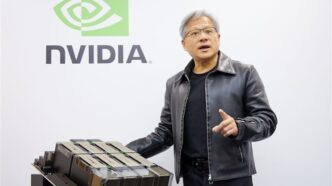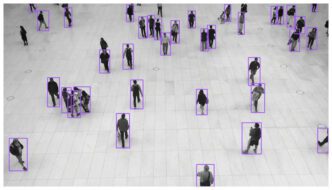At the start of the year, Nvidia was sitting on top of the world with a market cap of $3.49 trillion. But in just a few short months, it has lost over a third of that value—about $1.15 trillion—triggered first by AI competition and now, more painfully, by growing U.S.-China trade tensions.
The unraveling began when DeepSeek, a rising AI startup, jolted investor confidence in late January. Nvidia lost $600 billion in market value in just a matter of hours. But the real blow landed this month when the U.S. tightened chip export restrictions, effectively cutting Nvidia off from one of its most lucrative markets—China.
Nvidia confirmed on Tuesday that the new rules are expected to slash $5.5 billion from its quarterly revenue, largely due to halted shipments of its H20 AI chips to China and neighboring regions. The market reaction was swift and unforgiving. Shares tumbled 6% in after-hours trading, followed by another 5.8% drop on Monday. Nvidia’s stock now trades at $95.60, pushing its valuation down to $2.34 trillion.
As Nvidia’s grip loosens, Huawei is moving in with precision.
Huawei Moves Fast to Fill the Nvidia Gap
While Nvidia scrambles to recover lost ground, Huawei is stepping up. The Chinese tech giant is preparing to scale shipments of its new Ascend 910C chip, aimed directly at the AI GPU market Nvidia once dominated in China. Reuters reports that Huawei has already begun limited shipments and will ramp up deliveries by next month.
The Ascend 910C combines two 910B chips with enhanced engineering, offering 800 teraflops of FP16 performance and 3.2 TB/s of memory bandwidth. That’s roughly 80% of Nvidia’s H100 output—more than enough for Chinese firms seeking reliable domestic alternatives.
Huawei’s chips are built on a 7nm process, largely using Taiwan’s TSMC, though China’s SMIC is increasing its involvement. The company stockpiled TSMC components before restrictions tightened and is now scaling production with SMIC’s help. Huawei has set an ambitious goal to ship 100,000 910Cs and 300,000 910Bs in 2025.
But this isn’t just a chip play—Huawei is shipping entire AI systems. Its new CloudMatrix 384 platform packs 384 GPUs into a single unit, offering 300 petaflops of compute power—nearly double Nvidia’s latest GB200 NVL72 system. Although it draws more energy, Chinese firms are biting, given the price advantage and urgency to cut reliance on U.S. tech.
Nvidia Scrambles as China Cuts Deep
Facing mounting pressure, Nvidia CEO Jensen Huang reportedly flew to Beijing last week, meeting with trade officials as the company considers shifting more production to the U.S. But the damage may already be done. The H20 chip, once Nvidia’s main offering for China, is now caught in red tape. Exports require a special license, effectively blocking deliveries.
Tech giants like Baidu, Tencent, and ByteDance are now urgently seeking alternatives—and Huawei is offering exactly that.
Huawei began sampling the 910C with major Chinese AI players in late 2024 and is now delivering on those early orders. Industry analysts are already calling it a game-changer. Albright Stonebridge’s Paul Triolo says the 910C is fast becoming the chip of choice for AI developers in China. White Oak Capital’s Nori Chiou adds that U.S. export rules are inadvertently handing the market to Huawei.
China’s AI Chip Strategy Gains Momentum
Nvidia’s global dominance isn’t vanishing overnight, but China’s tech landscape is rapidly shifting. Following the latest export block, Nvidia’s shares slid another 3.1% in premarket trading. The company also confirmed that revenue from China has been cut in half.
At the same time, Huawei’s influence is expanding. In an interview with the Financial Times, Jensen Huang himself admitted Huawei is now a serious contender in the global AI chip race.
This shift fits into a broader narrative: China’s push for tech independence. With U.S. chips harder to obtain, domestic innovation is surging. Huawei says it’s boosted chip yields by 40% and is investing heavily in full-stack systems and ecosystem development.
Huawei’s biggest challenge remains software. Nvidia’s CUDA remains the gold standard for AI development, but Huawei is closing the gap. Its collaboration with top AI startups like DeepSeek could further strengthen its ecosystem—and widen the cracks in Nvidia’s China business.













